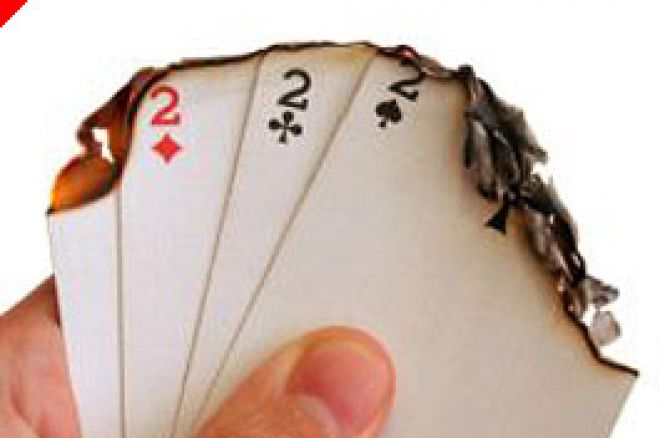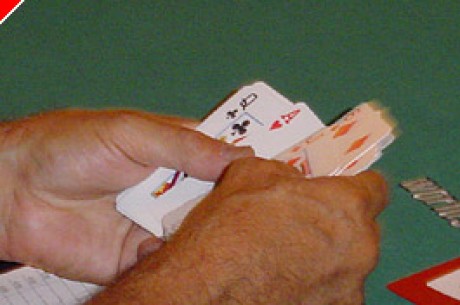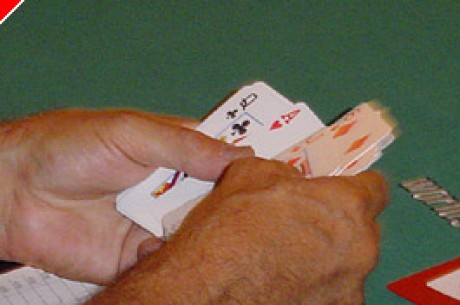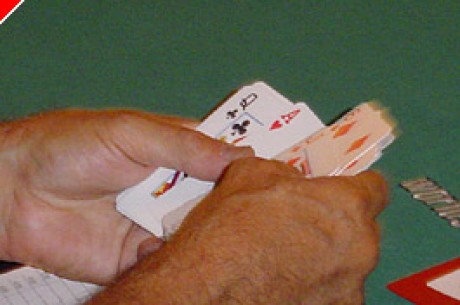Stud Poker Strategy: Quads on Fourth Street

Quads happen.
Sure, it's rare; very rare, in fact. But it does happen.
On average, you'll be dealt quads in the first four cards of 7-card stud about once in every 18,500 hands. If you play 30 hands an hour, that's about once every 600 hours. So if you're a three-days-a-week player and you play eight-hour sessions each day, you could end up with quads on the first four cards a couple times a year – 100 times in a lifetime if you play for 50 years.
So what do you do?
First, let me tell you about what not to do. I was in a home game that included several somewhat tired, loose and passive home game players. I was stuck about $100 in this $5 maximum game. I was dealt rolled-up fours. We played that the high card had the option of betting – as is often the rule in home games, I've found. Sure enough, another player, with an Ace, bet $3.00. There were no Aces out. Two players called. It was to me. I raised to $5.00. As expected, the Ace and the two other players called. There were no Aces or fours exposed.
On fourth street I was dealt the other four. Neither of the other players paired their board.
I thought hard about the play of the hand, wanting to maximize my win. I had raised with my trip fours on the prior round. If I checked now, after catching another four, it would look suspicious. I figured that I'd look stronger by checking than by betting. And I didn't want to look strong; I wanted callers all the way to the river. I also figured that with three opponents, all of whom were playing pretty loosely, that there was no chance that they'd all fold. The more money they put in the pot on fourth street, I reasoned, the better shot that they'd want to call later on – if they were on drawing hands. Given this thought, the size of the pot would entice them into incorrect calls.
So my only remaining question was how much to bet. If I bet $5.00 I might scare them off. If I bet $1.00 I might do the same thing – for the same reason that checking might look suspicious. So I elected to just repeat the initial bet of $3.00.
All three of my opponents folded. I couldn't believe it.
Believe it.
I made what I consider to be one of the worst mistakes of poker – although it rarely comes up.
When you hit quads on fourth street, suspicious though it may look, check. Always check, with no exceptions. And if you're fortunate enough to have opponents who bet or raise, always call and never raise.
Here's why: It's not just that you want to look weaker than you are. That's really not your primary motivation (nor why betting to look weaker than you would by checking is wrong in this instance). You check and call because you must give your opponents an opportunity to improve their hands.
You may well not win much money with your quads and paired door card. But the way you will make whatever money you do earn is by having an opponent improve. You must give him that opportunity – ideally, he'll improve to a full house or a flush. The risk that he'll fold because of your bet, low though it might be, is just too great for you to take any chance.
So again, it's true that your check may look suspicious. It may indeed convince your opponents that you hit trips. But at least they'll get another card if you check or if you call their bet. There's a chance that they could improve on that next card – and get a hand that will actually be willing to give you action. If you bet, you may take away that chance and deprive yourself of the serious money you want to make when you hit quads.








